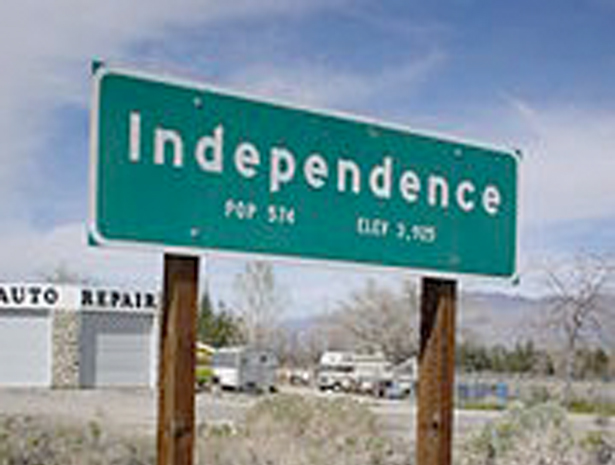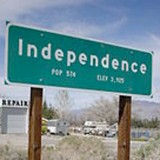In-line with Independence Day here in the US, I figured it’s a good opportunity to deconstruct the concept of independence and throw it against Italian cinema backdrop. You can never know what you’ll find. When we speak of independence you can literally place it in wide range of contexts; from emotional, financial, political, to physical. And I am sure I missed others.
 Yes, there is a place called Independence in CA
Yes, there is a place called Independence in CA
Looking at emotional independence we may ascribe it to being completely over a past romance or in control of a current relationship. In Visconti’s White Nights – Le notti bianche (1957), we see how the character of Mario (Marcello Mastroianni) gradually and surely becomes emotionally dependent on Natalia (Maria Schell). Only when Mario acknowledges that Natalia belongs to another, we can start see the transition into emotional independence, or put differently, Mario’s rational takes over his emotions. When you actually need to compromise your emotional aspirations and keep them at bay. Similar symptoms we can find in Antonioni’s The Outcry – Il Grido (1957), yet with one difference; Aldo’s (Steve Cochran) complete emotional dependence on Irma (Alida Valli) is never resolved and drives him into his dramatic fate.
Sometimes financial independence is exchanged for emotional dependence; Cabiria in Fellini’s Nights of Cabiria – Le Notti di Cabiria (1957), appears to project both emotional and financial independence, but internally she is extremely vulnerable to the point she puts her heart and money in a scoundrel that robs her out of both. That’s not always the case, sometimes financial independence is solid, but through the passage of time, it empties up emotions and turns them backwards into nostalgic flair. The older Toto (Jacques Perrin) in Torantore’s Cinema Paradiso (1988) is a big shot director that carries an emotional void to his past – his old village, his mentor, first love and the cinematic masterpieces of his youth that serve as memory milestones of time and places long gone.
Whereas the family structure is missing in older Toto’s life, then in Gabriele Muccino’s Remember Me My Love – Ricordati di me (2003), we get to see a middle class, financially stable family, where time erodes emotional ties among its members. Each one is on a separate trajectory to find emotional compensation to add meaning to their existence. And like in Cinema Paradiso, searching the past to help the present, Carlo (Fabrizio Bentivoglio) turns to an old flame.
Political independence is also a recurring theme in Italian cinema, from heroic stories of resistance against all odds as depicted in Francesco Rosi’s Salvatore Giuliano (1962), Gillo Pontecorvo’s The Battle of Algiers – La battaglia di Algeri (1966) or Visconti’s The Earth Trembles – La Terra Trema (1948), to name a few. The ingredients include a deprived minority that struggles to better its conditions by being able to control its destiny and well-fare. The battle not always succeeds (La TerraTrema) and involves painful sacrifices in effort to attain an elusive independence.
Movies can attempt to tell a story that might appear as realistic, and authentic. Yes, I can relate to this emotional independence or its lack thereof – it also happened to me. Yet, the way I see it, behind every movie there is a personal story the director is trying to convey. Unfortunately, 99% of the time, we as spectators cannot possibly be exposed to the depth of details that caused the director for example, to pick those particular job candidates in Olmi’s The Job – Il Posto (1961), as an expression for his views about work, neorealism and choice of non-professional actors, in this case true job seekers that can easily convey genuine in-context facial and body language. So what we’re left with is viewing the movie independently through our personal past experiences or future aspirations – as guides to extract meanings. If there is a nice alignment, we may come out liking the movie, if not then this patchwork of moving images with musical layering – was simply unmoving.
Checking the dictionary, I found this definition:
The state or quality of being independent; freedom from dependence; exemption from reliance on, or control by, others; self-subsistence or maintenance; direction of one’s own affairs without interference.
Pretty much covering the usual suspects. Regardless, you know what your independence truly means, that fine balance between being in control and the need to depend on trusted sources in order to form a logical sense of it all.

